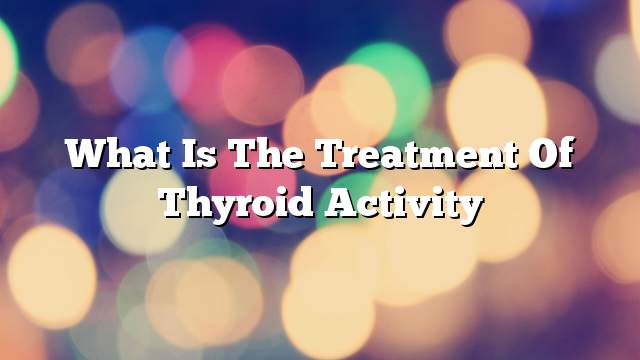Thyroid Gland Thyroid
These hormones, which in turn control metabolic processes, regulate vital functions in the body such as: breathing, heart rate, muscle strength, and weight. Body, and also regulate the functions of the central nervous system, and uses this iodine gland in the body to make the most important hormones, namely: Triodothyronine (T3), and Thyroxine (Thyroxine (T4 “, and it is necessary to keep these hormones within the rate Because they are of great importance in many functions Different body.
Hyperthyroidism
A disorder in the normal range of thyroid hormones, where the secretion is more than the need of the body, which leads to the acceleration of metabolism, and accelerate the burning of energy, high heartbeat, sweating, may become a nervous, and affects the disease more women than men, In children, the patient turns to the doctor to give him appropriate treatment.
Causes of thyroid activity
- Graves ‘disease: Graves’ disease, an autoimmune disease, one of the most common causes of thyroid activity, and increases the secretion of hormones.
- Functional thyroid tumor (hot nodules) “Thyroid Nodules”: an abnormal growth of thyroid gland.
- Thyroiditis is the result of viruses or bacteria that lead to an imbalance in the immune system. The body produces antibodies that attack the thyroid gland and thus lead to hormones leaking into the blood.
- Increase the intake of food or medicines containing iodine, as the thyroid gland is used to make hormones.
- Take too many thyroid hormones.
Thyroid symptoms
These symptoms depend on the extent of increased thyroid hormones, the more these hormones in the blood, increased metabolism, and increased severity of the disease, and these symptoms:
- Irregular heartbeat.
- Weight loss.
- A shiver in the hand.
- Sweating, and allergies to high temperatures.
- Feeling hungry, uncomfortable.
- Increase bowel movement.
- Irregular menstrual cycle in women.
- Itching.
- Hair loss.
- Breast enlargement in men.
- Muscle weakness.
- Neurosis.
- Nausea, and vomiting.
- Anxiety.
Treatment of thyroid activity
Treatment depends on the severity of the disease, whether these symptoms are simple or complex, and the doctor determines the appropriate treatment depending on: age of the person, the size of the thyroid, and the presence of other diseases or symptoms. Treatment includes:
- Beta blockers: The drugs that treat the symptoms immediately, caused by increased thyroid hormones and these symptoms increase heart rate, and these drugs slow heartbeat, as it is contrary to the effect of increased thyroid hormones, which increase metabolism, but does not change the level of hormones in the body, Examples of these drugs are: Propranolol (propranolol), atenolol (Atenolol).
- Drugs that inhibit the secretion of thyroid hormones , Because it limits the thyroid gland from the production of hormones, and because the thyroid hormones are made of iodine and stored in their cells, do not show the effect of these drugs only when the consumption of all hormones stored in the thyroid and consumption of hormones in the blood, including these drugs: methimazole ” “Propylthiouracil”, and the risks associated with these drugs may get when some people are inhibiting the production of white blood cells from the bone marrow, which leads to impaired immunity. Some research has shown that the use of these drugs for one to two years led to the recovery of 40-70% of people.
- Radioactive Iodine: This drug is taken orally; it destroys the cells that enter it, and because it is picked up only from thyroid cells, this destruction is only localized in the thyroid gland and does not spread to any other place. It has been shown that 80% of patients have been cured with one dose of radioactive iodine. The body needs 8-12 weeks to return the thyroid gland to normal.
- Surgery: The removal of a part of the thyroid cells that secrete hormones in large quantities and the risks of surgery; the destruction of cells adjacent to the thyroid gland (such as the nerves that supply the vocal cords, and the thyroid gland that regulates the level of calcium in the body), and perform these operations for people who can not take Antihypertensive drugs of the thyroid (such as pregnant women, children who have side effects of these drugs), and also those who suffer from hyperthyroidism significantly.
This article does not depend on a medical reference, and you should not consult your doctor.
